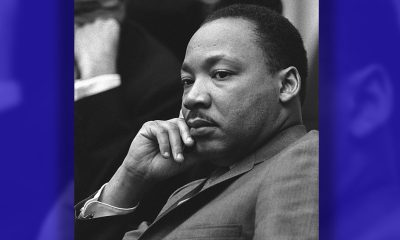#NNPA BlackPress
Inside The Hollywood Writers’ Strike
Hollywood’s writers are on strike — and the ongoing conflict may affect some of your favorite shows. The Writers Guild of America (WGA) is a labor union representing roughly 11,500 writers for TV and film. The Alliance of Motion Picture and Television Producers (AMPTP) represents eight major studios: Amazon, Apple, Disney, Netflix, Sony, Warner Brothers, […]
The post Inside The Hollywood Writers’ Strike first appeared on BlackPressUSA.
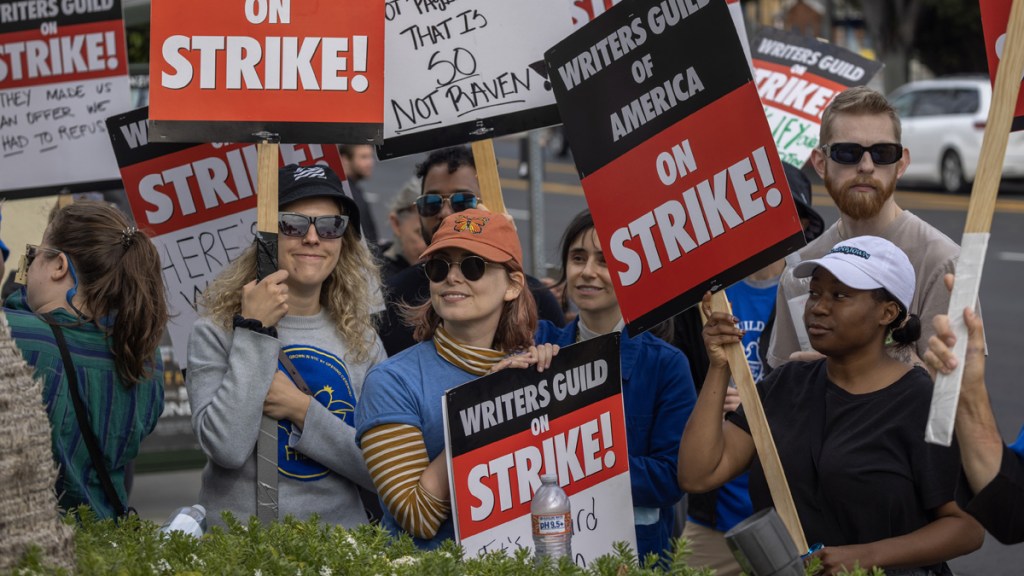

Hollywood’s writers are on strike — and the ongoing conflict may affect some of your favorite shows.
The Writers Guild of America (WGA) is a labor union representing roughly 11,500 writers for TV and film. The Alliance of Motion Picture and Television Producers (AMPTP) represents eight major studios: Amazon, Apple, Disney, Netflix, Sony, Warner Brothers, NBC Universal, and Paramount. Disagreements between the two sides have led writers to walk off the job, in their first strike since 2007.
After six weeks of negotiation with AMPTP, the WGA announced that members would go on strike starting at 12:01 AM on May 2. This means that no WGA member will write any new scripts for TV shows or movies until the WGA votes to end the strike. (Those who work in radio, streaming news, or public TV will stay on the job, according to Vox Media.) The goal of the strike is to force the AMPTP to negotiate a new deal — preferably one that honors the union’s requests.
The WGA negotiates a new contract with the studios every three years. But negotiations have broken down this time because the sides are so far apart. “The WGA Negotiating Committee began this process intent on making a fair deal, but the studios’ responses have been wholly insufficient given the existential crisis writers are facing. The companies’ behavior has created a gig economy inside a union workforce,” the WGA said in a statement. Back in April, the WGA voted — by a 97.85% margin — to authorize a strike if no deal was reached by May 1.)
At the core of the dispute are issues related to the rise of streaming services and the emergence of AI (artificial intelligence). These two technical changes present challenges for writers and their ability to make a living.
Streaming
Instead of traditional broadcast and cable TV, more and more people are turning to streaming services. Instead of watching CBS, NBC, or ABC, more viewers are watching online platforms like Hulu, Netflix, Amazon Prime, Paramount+, and HBO Max. Last year, streaming services got more viewers than cable or broadcast for the first time ever, per Nielsen. But this streaming boom has affected writers.
Before streaming, writers could make money by selling an idea for a film or TV series to a studio. TV executives would order a series and a “writers’ room” would assemble: a group of writers would gather to write about 20-22 episodes of a series. Writers could gain experience in their field and eventually move up to become showrunners. (According to MasterClass, a showrunner finalizes scripts, oversees budgets, selects/approves all writing staff, and assigns episodes to writers.)
Now, as streaming grows, studios have “mini-rooms” in which smaller groups (2-3 writers, as opposed to 7-8 or more) are hired to write episodes of a show before it even gets picked up. This saves studios money, but writers get paid less, and the often-combined roles of writing and production are separated. As Vox puts it: “The mini-room model makes writers as disposable as possible and ensures they’re not even around (and thus getting paid) when production begins.”
Streamers also order fewer episodes (6-10 versus 22), meaning writers are working for shorter periods of time. Writers work 20-24 weeks on streaming shows, as opposed to 29-40 weeks in network TV, per the WGA. That means writers are paid less for each job. This affects their rates of minimum basic agreement, or MBA — kind of like a minimum wage for writers, Vox says. The average weekly pay for the lowest-paid writers is roughly $4,500 a week, per Variety.) The chart below shows streaming’s effect on writers and their pay.

Median weekly writer-producer pay has declined 4% over the past decade. Adjusting for inflation, that’s a 23% drop. (When accounting for inflation, median screenwriter pay has declined 14% since 2018.) And despite working similar hours, showrunners also make less: median weekly pay for showrunners on streaming series is 46% lower than on broadcast shows.
So, writers are working less and taking home less pay on streaming shows. And income that would help them bridge the gap are also dwindling. That brings us to another issue: residuals. They’re like royalties for screenwriters. If you write for a show and a network buys the rights to air it, you get a check. If the show is popular and runs in syndication (like Friends, Living Single or even House of Payne), you receive a residual check — often a critical source of income for writers. But residuals for streaming series are lower than for broadcast.
The WGA has proposed improvements to these issues, as shown in the left column below. As you can see, the Guild and the AMPTP are still far apart on terms for an agreement.

The WGA has proposed minimums for writers’ room size and for employment span. But the AMPTP explained its resistance to the WGA’s proposal to institute a minimum size for writers’ rooms, as well as a minimum duration of employment. “While the WGA has argued that the proposal is necessary to ‘preserv[e] the writers’ room,’ it is in reality a hiring quota that is incompatible with the creative nature of our industry. We don’t agree with applying a one-size-fits-all solution to shows that are unique and different in their approach to creative staffing,” the AMPTP says.
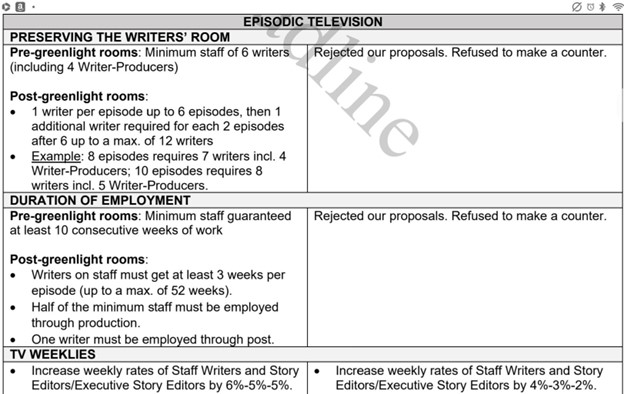
A.I.
Another issue for the writers is AI. Writers want strict limits on how artificial intelligence is used. Essentially, they don’t want to rewrite AI-generated material or have AI rewrite human scripts. There’s also concern that, someday, an AI tool could be used to generate a plot idea or script; then writers would be hired to revise (or “punch it up”) at a lower rate.
So, the WGA proposed limits on AI during negotiations. GQ explains: “The WGA proposed regulating the use of so-called generative AI in writers’ rooms—preventing AI from “writing” or changing material covered by the Minimum Basic Agreement, preventing it from being used as source material from adaptations, and ensuring that MBA material can’t be used to train these programs.” The AMPTP countered by offering “annual meetings to discuss advances in technology.”
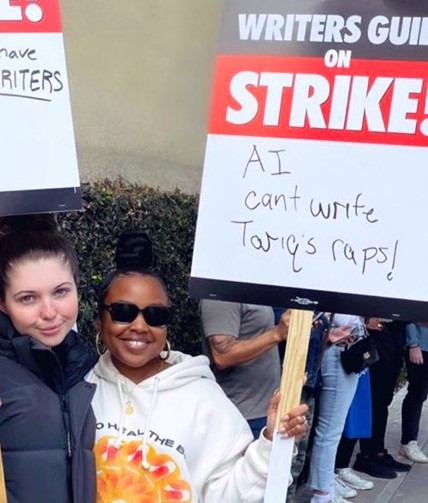
Quinta Brunson and protester (Photo via Twitter)
Strike Effects
So how will this strike affect all your favorite shows? It depends on what kind of shows they are. The season finale of NBC’s Saturday Night Live is still up in the air. Late-night talk shows are the first to be affected: The Tonight Show Starring Jimmy Fallon, The Late Show with Stephen Colbert, Jimmy Kimmel Live, Late Night with Seth Meyers, and The Daily Show will all go dark this week. The effect on streaming series has yet to be seen, but some broadcast shows have already altered course.
Writers for the ABC sitcom Abbott Elementary were supposed to start work on the third season on May 2 — the day the strike started. Now, when the show will resume production is unclear. “Everything is in flux because of the strike,” actress Sheryl Lee Ralph told TODAY. Series creator and star Quinta Brunson (who won an Emmy last year for writing the show’s pilot) issued statements of solidarity with her fellow writers.
Brunson tweeted on May 2: “I am a writer. I’m in the WGA. I’m also on strike! I have no real power here other than to join my union in demanding fair compensation for writers!” In another tweet, Brunson wrote, “This week you’ll probably find me on picket line. This strike also isn’t about me, and I don’t want to make it about me. It’s about all writers  support the WGA. No show or movie you love is written without… writers.”
support the WGA. No show or movie you love is written without… writers.”
The post Inside The Hollywood Writers’ Strike appeared first on Houston Forward Times.
The post Inside The Hollywood Writers’ Strike first appeared on BlackPressUSA.
#NNPA BlackPress
Lawmakers Greenlight Reparations Study for Descendants of Enslaved Marylanders
BLACKPRESSUSA NEWSWIRE — Maryland lawmakers have approved Senate Bill 587, authorizing the creation of the Maryland Reparations Commission.
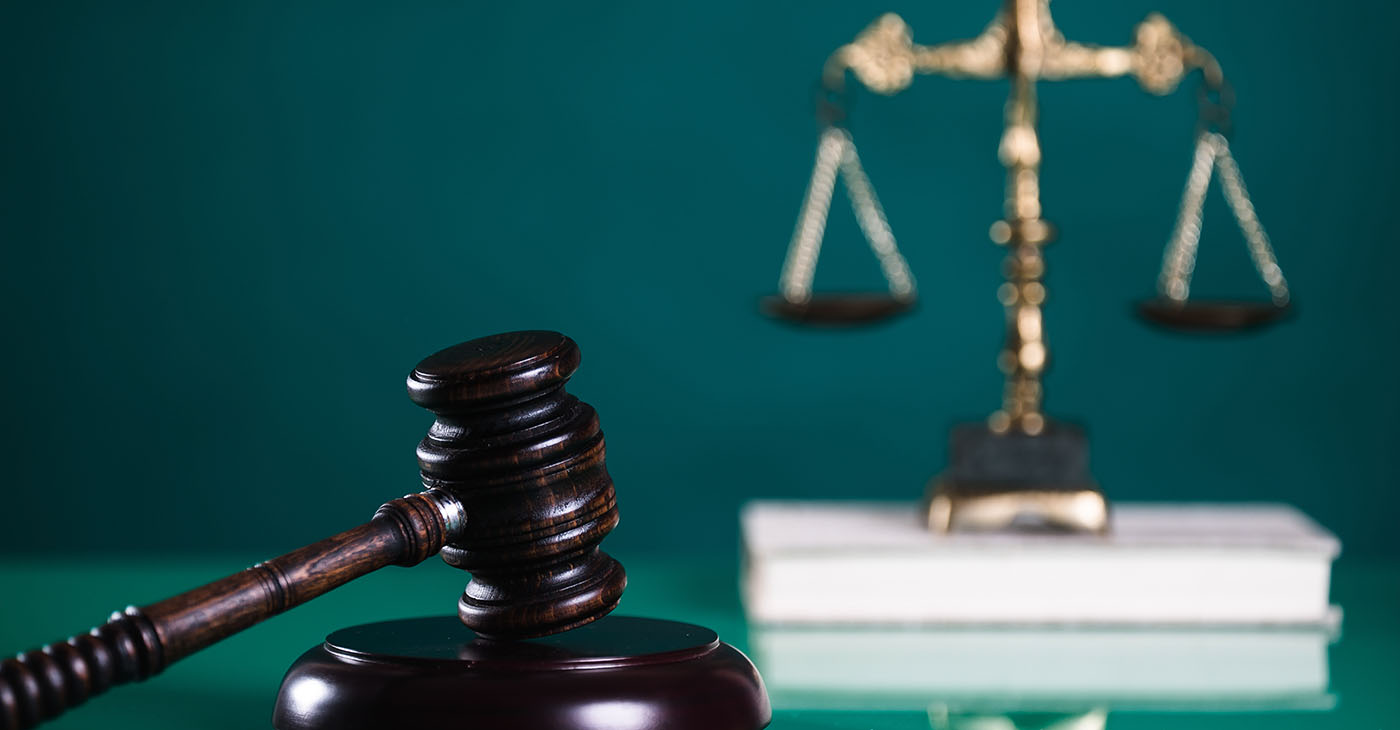
By Stacy M. Brown
BlackPressUSA.com Senior National Correspondent
Maryland lawmakers have approved Senate Bill 587, authorizing the creation of the Maryland Reparations Commission. The body will study and make recommendations for reparations to descendants of enslaved people and others harmed by centuries of discriminatory policies. The legislation now awaits the governor’s signature and is scheduled to take effect July 1, 2025. The commission will examine Maryland’s long history of slavery, the economic and social systems that benefited from it, and the lingering impacts of those institutions. Its work will include recommendations on financial compensation, housing and business support, tuition waivers, and other forms of restitution. “This commission is not only about acknowledging our past – it’s about using that understanding to pave the way for a more equitable and fair future,” said Del. Jheanelle Wilkins, Chair of the Legislative Black Caucus of Maryland, which made reparations a top priority for the first time this legislative session.
From its founding in 1634 until the abolition of slavery in 1864, Maryland was a society built on slave labor. Tobacco, the colony’s staple crop, fueled economic growth and political dominance for the state’s elite. By the mid-18th century, nearly one-third of Maryland’s population was enslaved. Skilled and unskilled laborers like Frederick Douglass, who caulked ships in Baltimore, contributed to the state’s prosperity under brutal conditions. The legacy of that bondage continued to echo across generations. Del. Aletheia McCaskill, the lead sponsor of the House version of the bill, said the measure lays the groundwork for redress. “I am overjoyed at the passage of this monumental legislation,” McCaskill said. “This commission will gather historical evidence, examine present-day disparities, and provide a data-driven framework to acknowledge past harms. By recommending policies and developing solutions to repair the damage done, we can take meaningful steps toward true equity in our state.”
Sen. C. Anthony Muse, sponsor of the Senate version, called the passage historic. “We took a historic step towards justice and healing for our communities,” Muse remarked. “The passage of Maryland Senate Bill 587 marks a significant commitment to addressing the long-lasting effects of slavery and systemic inequities.” The commission’s membership will include lawmakers, historians, HBCU scholars, civil rights experts, representatives from the NAACP and the Maryland Black Chamber of Commerce, and members of the public. It will examine reparations programs in other states and recommend procedures for verifying eligibility and the feasibility of funding and distributing reparations. Maryland’s history makes it a powerful setting for this initiative. The state witnessed the forced transport of nearly 100,000 Africans during the 18th century. The rise of tobacco plantations led to a devastating regime marked by family separation, disease, forced labor, and systemic brutality. Enslaved individuals in Maryland built canals, smelted iron, and helped fuel the economic engine of the state while living under constant threat of sale or violence. The stories of individuals like Hillery Kane at Sotterley Plantation and Lucy Jackson at Hampton Mansion reveal not only the cruelty of slavery but also the resilience and resistance of the enslaved.
By the 19th century, Maryland became a central player in the domestic slave trade, with an estimated 20,000 people sold to cotton plantations in the Deep South between 1830 and 1860. Even after emancipation in 1864, freed Black Marylanders faced decades of disenfranchisement, segregation, and economic exclusion. “This is about more than history,” Wilkins said. “It’s about how that history has shaped the realities of today.” The commission will submit a preliminary report by January 1, 2027, and a final report by November 1, 2027. It will explore possible sources of funding, such as businesses and institutions that benefited from slavery and discriminatory government practices.
Opposition to the bill has centered mainly on its cost, but the fiscal note details only a modest increase of $54,500 in 2026 to fund contractual staff. No reparations payments are authorized under the current bill. Maryland is joining California, Colorado, Illinois, Massachusetts, and New York in forming a reparations commission. The move comes as diversity, equity, and inclusion initiatives face increasing national scrutiny and political attacks. Still, supporters of the commission insist the time for reckoning is now. “We’re not just commemorating the past,” McCaskill said. “We are charting a course toward justice, informed by our truth and grounded in our responsibility to future generations.”
#NNPA BlackPress
Harris, Obama, and Booker Step Up as Resistance Against Trump Takes Shape
BLACKPRESSUSA NEWSWIRE — Obama, meanwhile, broke his silence during an appearance at Hamilton College in New York, offering one of his sharpest public critiques yet of Trump’s second administration.
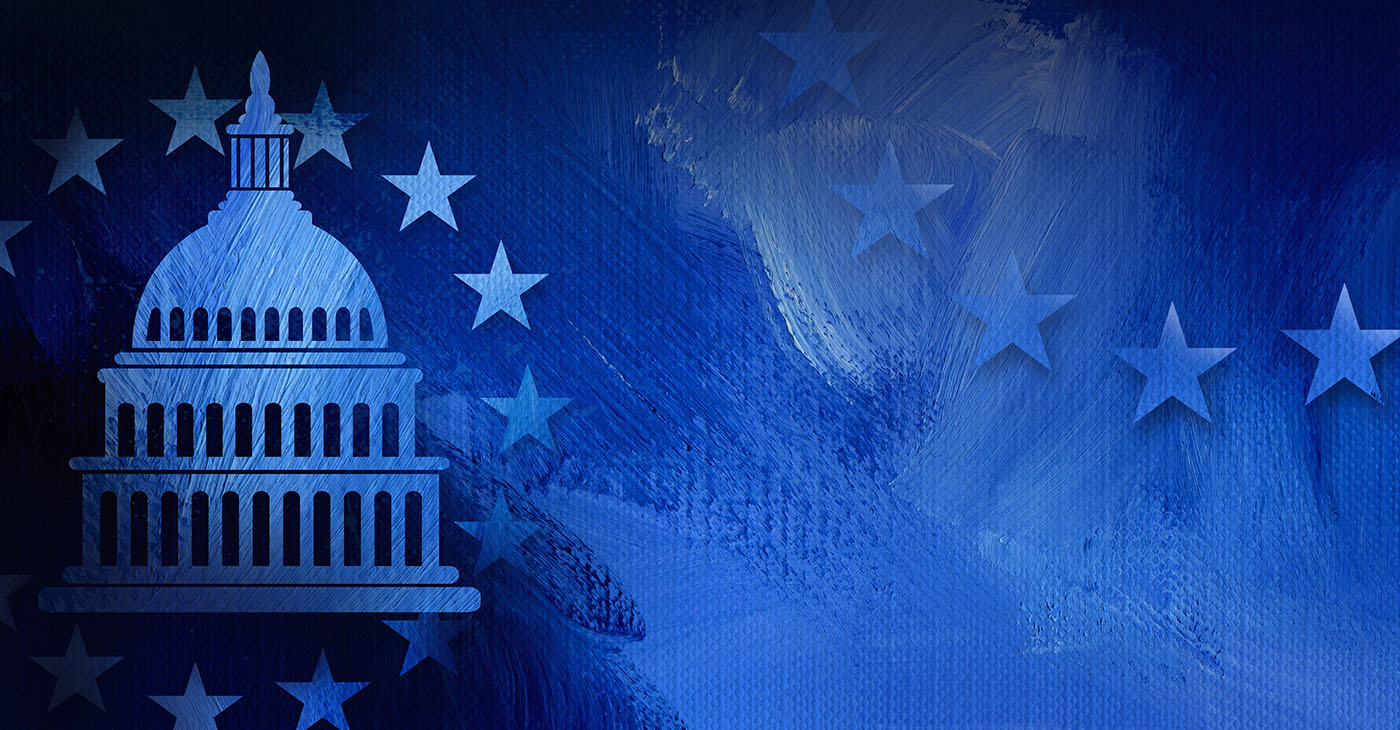
By Stacy M. Brown
BlackPressUSA.com Senior National Correspondent
Is the resistance finally taking form?
As Kendrick Lamar asked during his powerful Super Bowl performance, “Are we really about to do it?” That question now echoes in the political arena as former President Barack Obama and former Vice President Kamala Harris have entered the public fray, joining voices like New Jersey Sen. Cory Booker and Texas Rep. Jasmine Crockett in confronting President Donald Trump and his administration’s sweeping changes head-on. After months of relative silence following her defeat to Trump last November, Harris returned to the spotlight Thursday during a rare appearance at the Leading Women Defined conference at a seaside resort in Dana Point, California. According to The Los Angeles Times, she didn’t mention Trump by name but spoke forcefully about the anxiety many Americans are experiencing under his new administration.
“There is a sense of fear that is taking hold in our country, and I understand it,” Harris said. “These are the things that we are witnessing each day in these last few months in our country, and it understandably creates a great sense of fear. Because, you know, there were many things that we knew would happen, many things.” “I’m not here to say, ‘I told you so,’” she continued. “I swore I wasn’t going to say that.” The appearance marked a shift in tone for Harris, who has been weighing a potential run for governor of California in 2026 or waiting until 2028 for another shot at the presidency. Still, she clarified that her political silence hasn’t equated to surrender. “We can’t go out there and do battle if we don’t take care of ourselves and each other,” Harris told the crowd. “I’ll see you out there. I’m not going anywhere.”
Obama, meanwhile, broke his silence during an appearance at Hamilton College in New York, offering one of his sharpest public critiques yet of Trump’s second administration. He condemned Trump’s attempts to reshape the federal government, stifle dissent, and punish those who oppose his policies. “So, this is the first time I’ve been speaking publicly for a while,” Obama said. “I’ve been watching for a little bit.” “Imagine if I had done any of this,” Obama added. “It’s unimaginable that the same parties that are silent now would have tolerated behavior like that from me or a whole bunch of my predecessors.” While calling Trump’s proposed tariffs bad for America, Obama said his larger concern lies with what he described as the White House’s alarming overreach.
“I’m more deeply concerned with a federal government that threatens universities if they don’t give up students who are exercising their right to free speech,” he said. “The idea that a White House can say to law firms, if you represent parties that we don’t like, we’re going to pull all our business or bar you from representing people effectively. That kind of behavior is contrary to the basic compact we have as Americans.” Obama, who campaigned for Harris during the final stretch of the 2024 election, had warned that a second Trump term would endanger the nation’s democratic norms. “Just because [Trump] acts goofy,” Obama said at the time, “doesn’t mean his presidency wouldn’t be dangerous.” With Trump’s second term underway, the voices of resistance are growing louder.
Sen. Cory Booker added fuel to the movement by making history on the Senate floor. He delivered a 25-hour, 5-minute filibuster that broke the record previously held by segregationist Sen. Strom Thurmond. Thurmond’s 1957 filibuster—lasting 24 hours and 18 minutes—was aimed at blocking the Civil Rights Act. Booker used his record-breaking speech to denounce what he called a deliberate dismantling of government at the hands of Trump, Elon Musk, and Congressional Republicans. “It always seemed wrong,” Booker said, referring to the Senate room still named after Thurmond. “It seemed wrong to me when I got here in 2013. It still seems wrong today.”
The New Jersey senator, a descendant of both enslaved people and slave owners, framed his marathon speech as a moral plea, reading letters from Americans affected by deep cuts and policy threats to Medicare, Medicaid, Social Security, and SNAP. “This is a moral moment,” Booker declared. “It’s not left or right; it’s right or wrong.” With Booker’s record-setting stand, Harris’s reemergence, and Obama’s warning shots, what once felt like fragmented frustration among Democrats may now be coalescing into something more deliberate: a resistance that is finally, visibly, on the move. “I’ll see you out there,” Harris said. “I’m not going anywhere.”
#NNPA BlackPress
Dr. King and the Reason He Protested on His Assassination Anniversary
BLACKPRESSUSA NEWSWIRE — King was in Memphis to support striking African-American sanitation workers upset over poor working conditions and low pay. At his death, King also organized the Poor People’s Campaign to address poverty and economic inequality.
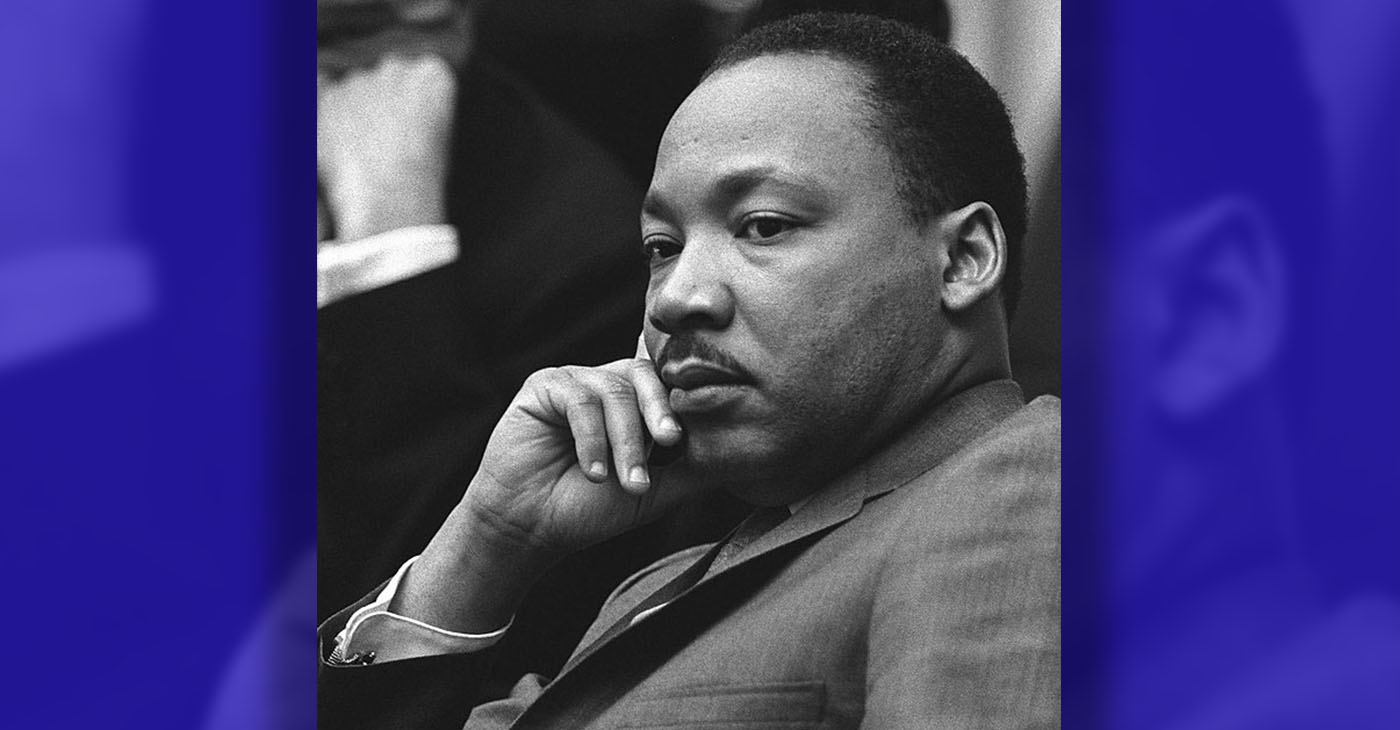
By April Ryan
The Media Panel at the National Action Network Convention in the NYC
“What would Martin do?” asked Mary Francis Berry, the former head of the U.S. Commission on Civil Rights. Berry was a college student when the news reports were delivered that Dr King was assassinated. More than half a century ago today, Dr. Martin Luther King Jr. was fatally shot on the balcony of the Lorraine Motel in Memphis, Tennessee. King was in Memphis to support striking African-American sanitation workers upset over poor working conditions and low pay. At his death, King also organized the Poor People’s Campaign to address poverty and economic inequality. Almost 60 years later, African Americans are withholding their dollars from companies like Target that have rolled back Diversity, Equity, and Inclusion programs. Target’s stock has dropped drastically, and it is reported that the company has lost billions of dollars from this action. On a related note, the National Urban League says that Black America’s buying power is close to $2 trillion. Major rallies around the nation, the majority of which are white-led, are protesting a new rollback in rights and freedoms created by the Trump agenda.
Thursday, in New York City, at the National Action Network convention during the media panel, the crowd in the packed ballroom stood to their feet, pumping their fists and shouting, “he’s a racist, “directing their ire at President Donald Trump. Freedom to protest in this country during difficult times is a blueprint Dr. Martin Luther King Jr. and his lieutenants left during the civil rights era. Berry remembers consulting with Dr. King’s widow, Coretta Scott King, and wondering what the civil rights icon would do whenever they started a protest like the “Free South Africa” movement and protests against the “unfair treatment of Haitians” and the “LGBTQ+ people and whatever.” The “checklist” of items to confirm this is what Dr. King would support is included in his book Where Do We Go From Here? The questions are: “Is it safe? Is it political? Is it popular? Is it right?” Protests and boycotts abound in this nation, and a significant protest is slated for this Saturday in Washington, D.C. 1000,000 people are expected to show up and protest against the MAGA and Project 2025 agenda Donald Trump follows. Berry reminds us that Dr. King supported peaceful protests and economic boycotts. At age 26, King led a nonviolent protest against segregated bus seating in Montgomery, Alabama, a pivotal event in the civil rights movement.
-

 Activism2 weeks ago
Activism2 weeks agoWe Fought on Opposite Sides of the Sheng Thao Recall. Here’s Why We’re Uniting Behind Barbara Lee for Oakland Mayor
-

 #NNPA BlackPress2 weeks ago
#NNPA BlackPress2 weeks agoRev. Dr. Jamal Bryant’s Black Church Target Boycott Mobilizes 150,000
-

 Activism4 weeks ago
Activism4 weeks agoOakland Post: Week of March 5 – 11, 2025
-

 Activism3 weeks ago
Activism3 weeks agoSan Francisco Is Investing Millions to Address Food Insecurity. Is Oakland Doing the Same?
-

 #NNPA BlackPress4 weeks ago
#NNPA BlackPress4 weeks agoTrump Moves to Dismantle Education Department
-

 #NNPA BlackPress2 weeks ago
#NNPA BlackPress2 weeks agoRecently Approved Budget Plan Favors Wealthy, Slashes Aid to Low-Income Americans
-

 #NNPA BlackPress4 weeks ago
#NNPA BlackPress4 weeks agoFighting to Keep Blackness
-

 Activism2 weeks ago
Activism2 weeks agoFaith Leaders Back Barbara Lee for Mayor, Criticize Candidate Loren Taylor for Dishonest Campaigning





